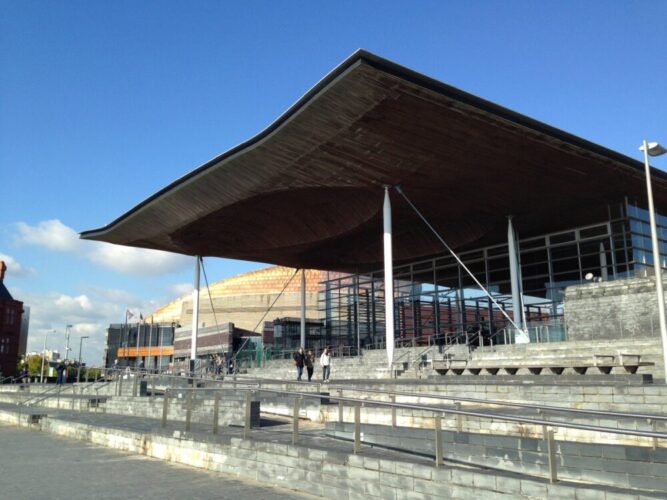By Chris Haines, ICNN Senedd reporter
A committee has called for a rethink of plans to introduce a “closed-list” system for Senedd elections amid concerns it could see voter choice trumped by political party influence.
The Senedd’s reform bill committee has raised significant reservations about the proposed closed-list system, which would see the electorate vote for parties rather than people.
Committee members, who have been scrutinising the Senedd Cymru (Members and Elections) bill, unanimously agreed that a closed-list system would reduce voter choice.
Experts including Alan Renwick, a political science professor at University College London, and the Electoral Reform Society, gave evidence that closed lists would be a retrograde step.
Prof Renwick described the plans as dangerous, warning it risks further disaffecting voters.
In a 231-page stage-one report, which makes 50 recommendations, the committee urged MSs to work together to reach agreement on amendments to the proposed voting system.
While the report did not recommend a specific alternative, MSs heard evidence in favour of an open or flexible list or the single transferable vote which would offer greater voter choice.
‘United’
David Rees, who chairs the reform committee, described the proposals as some of the most significant changes to Welsh democracy since the dawn of devolution.
He said: “We are united in our concerns about the impact of the voting system being put forward by the Welsh Government on voters’ ability to choose who represents them.
“Getting the electoral system right is fundamental to the health of democracy, and we have significant reservations about whether closed list elections represent a positive step forward.
“If the bill is voted through its first stage by the Senedd at the end of the month, we’re urging all political parties to work together to ensure the electoral system in the bill provides greater voter choice and improved accountability for future members to their electorates.”
Under the bill, the Welsh Parliament would increase in size from 60 to 96 members.
A majority of the committee backed this proposal but Darren Millar, the Conservatives’ member, dissented, saying he did not believe any increase was justified.
Mr Rees added: “Most of the committee’s members are persuaded by the evidence that reform is needed and that a larger Senedd will be better able to fulfil its responsibilities to the people of Wales – now and in the future.”
‘Warped’
Mr Millar, the Conservative shadow constitution minister, argued Wales needs more doctors, dentists, nurses and teachers – not more politicians.
He said “Proposing to increase the size of the Senedd by 60% while cutting public services exposes the warped sense of priorities that is typical of Labour and Plaid Cymru politicians.
“There is no public mandate for either a bigger Senedd or for the proposed changes to our voting system so none of these proposals should be implemented without the public having their say via a referendum.”
The 32 constituencies that will be used in the next general election will be paired to create 16 for the 2026 Senedd poll, with each returning six members.
MSs backed this plan but a majority called for a reduction in the proposed 10% margin between the size of constituencies which is twice that allowed in general elections.
The committee also raised concerns about powers in the bill for the Welsh Government to increase the number of ministers through regulations rather than primary legislation.
‘Fundamental’
Prof Renwick told the committee it is a fundamental point that it should not be for ministers to decide an increase in the number of ministers.
By majority, the committee urged the Welsh Government to remove this section, saying changes of such constitutional significance should be subject to the full legislative process.
The committee called for a mechanism in the bill to fill vacant seats if, for example, a party exhausts its eight-name list of candidates or an independent steps down.
MSs also recommended a consultation on changing the council election cycle to four years, in line with future Senedd polls, and urged ministers to consider a recall system.
The Senedd’s finance and legislation committees have also been scrutinising the bill, with the former calling for more details on the cost of expansion.
A debate and vote about the general principles of the Senedd Cymru (Members and Elections) bill will be held on Tuesday January 30.
The bill, which is likely to pass its first legislative hurdle, will then move on to stage two – which will see a committee of the whole Senedd consider amendments.
The reforms will ultimately require a supermajority of two-thirds support in the Senedd.
Please donate here: Support Carmarthenshire News Online Thank you for supporting independent journalism and contributing to the future of local news in Carmarthenshire. Carmarthenshire News Online has been dedicated to providing unbiased and trustworthy news, free from commercial or political influence. By donating as little as £1, you can help ensure the continuation of this important source of information for the community. Your contribution will have a significant impact on the sustainability of independent journalism. If you're looking to enhance your brand's visibility, we also offer advertising opportunities on our Livestream and podcasts. Our special offers provide excellent value for reaching our engaged audience. To learn more about these opportunities and to discuss your advertising needs, please feel free to call or text us at 07308598604. Thank you again for your support, and together we can ensure the availability of quality local news for Carmarthenshire and beyond.
Please donate here: Support Carmarthenshire News Online







